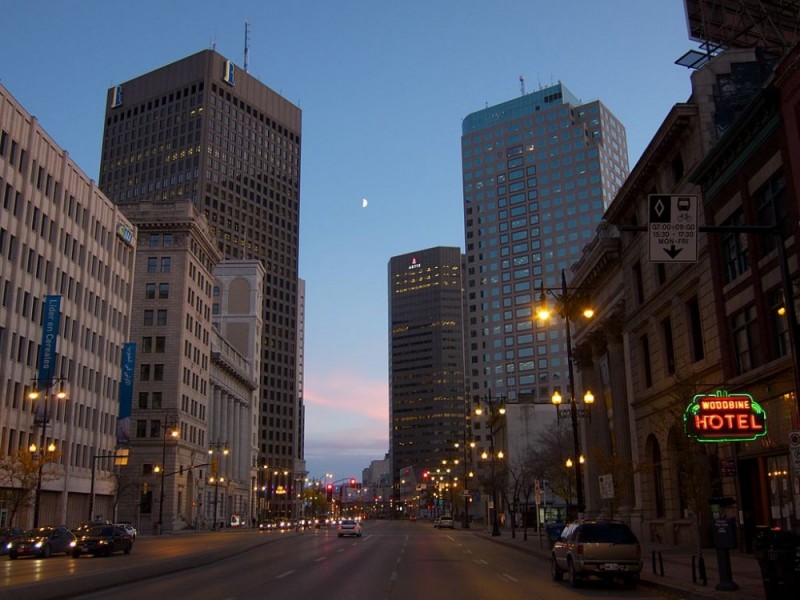Referendum on Portage and Main is a huge opportunity for Winnipeg urbanists

Photo by BriYYZ
One of the main issues emerging in the upcoming Winnipeg civic election (October) is whether or not the intersection at Portage and Main should be open to pedestrians. For those living outside of Winnipeg this may seem like a fairly innocuous issue, but it has animated strong reactions from both sides of the aisle. Recently it was announced that the issue will appear on the ballot this fall as referendum. The purpose of this article is not to break down the minutia of the debate, but instead to talk about the massive opportunity it is for those who want a less car-dependent and more accessible city. Sadly, it seems that Winnipeg’s urbanists — while talking a good game — lack the organizing chops to get it done.
If you are unfamiliar with the back story detailing why Portage and Main was closed in the first place, read this article from CBC Manitoba.
Opening Portage and Main has long been something urbanists in Winnipeg have wanted. During the last civic election, mayor Brian Bowman said that he would open up the intersection. Since then he has stalled on the issue and shown a willingness to support the referendum. The reaction from urbanists in Winnipeg was a meltdown. Long Twitter threads were written, and angry blog posts published. For the most part, the anger was petulant and misplaced.
Below, in bold, I have outlined some of the typical reactions and tried to explain why they represent a wrongheaded approach to the issue.
But Bowman said he would open Portage and Main! It was an election promise!
So? Sorry to break it to you, but politicians don’t always follow through on their promises, and when there is little pressure coming their way there is little incentive to do so. This isn’t cynical, this is just a statement of fact backed up by reading history and taking away key lessons. Politicians are generally opportunists and if they sense the winds blowing in one direction they will go in that direction. The tasks is to make the winds blow in the direction you want.
This referendum is a cheap political trick. We elect politicians to make decisions. Why should we leave it to the general population to make this decision?
Yes the referendum is a cheap political trick but it was not unpredictable. Outrage over the referendum question from the pro side is directly proportional to their lack of faith in organizing around the issue. For people who claim to want the best for Winnipeg, they don’t hold their fellow citizens in high regard. This is very telling about what their ‘urbanism’ is really about.
The suburbs ruin everything in this city and hold the city back. People in the burbs are a bunch of uncultured rubes who don’t know what’s best for them.
When you get down to it, this is what animates many of the ‘urbanists’ in Winnipeg. The problem with this attitude is that it essentially means you are justified in throwing up your hands and never actually doing anything about it. More importantly, it reduces what are political and economic choices that have played out since the 1950s into personal lifestyle choices. It is infinitely easier to simply make wide sweeping claims about people who live in the suburbs rather than trying to understand how and why we got here. It is one thing to say you hate “car culture”; it is another to understand how car and oil companies spent massive amounts of money on PR campaigns to defund public transit.
It is one thing to say you hate the suburbs but its another thing to understand how housing policies and the mortgage and insurance industry contributed to the hollowing our of downtowns and inner cities across the continent. It is one thing to complain that the suburbs ruin everything in Winnipeg, but it is another to understand how the original plan of Unicity has been eroded, and democracy at city hall is pretty much non-existent today.
When you account for these economic and political factors, one comes to a fulsome picture: there is ample space to create a people’s urbanism in Winnipeg, one that brings together people from across the city (not just the privileged few) to prioritize public transit, accessibility, and robust local democracy. The referendum on Portage and Main this fall is the perfect chance to create it.
Scott Price is a labour historian and radio producer living in Winnipeg.










